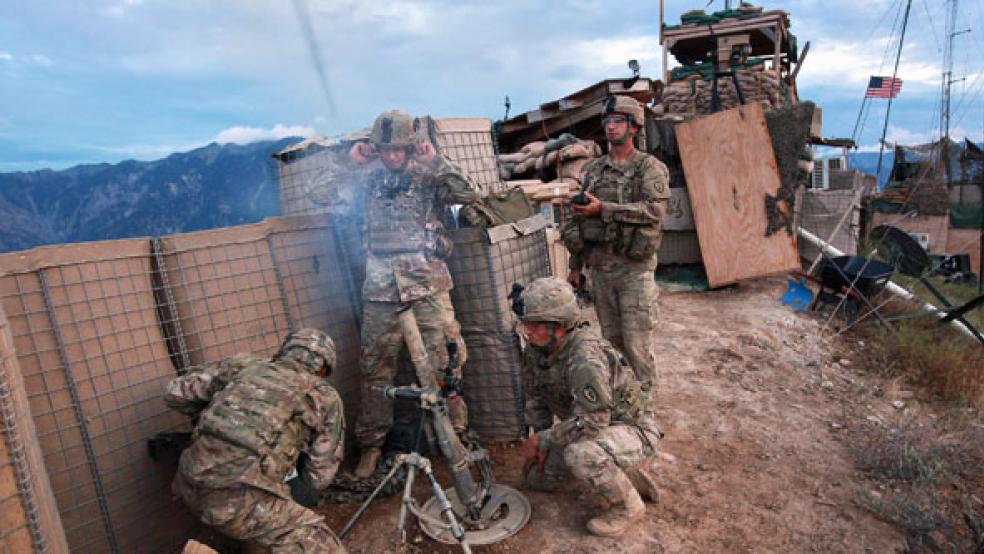
As the United States prepares to withdraw forces from Afghanistan, ending the longest conflict in the country’s history, it is also marking a dramatic shift toward a small war model.
Even as the majority of U.S. troops depart, it’s becoming increasingly clear that the American commitment will not end when the last battalion leaves. As The Fiscal Times recently reported, the United States is going to have to spend tens of billions of dollars if it does not want to squander the gains made in the last decade.
But as the cost of maintaining a presence in Afghanistan becomes clearer, and as the Pentagon enters a drawdown period, some in Washington are now asking whether it would be better just to simply leave the country without turning on a post-war money faucet.
“It’s time to understand that we can’t remain in Afghanistan at all costs,” said Malou Innocent, a foreign policy expert at the Cato Institute and contributor to a policy paper that makes the case for leaving. “We must understand that if we commit to Afghanistan in the long term it might restrict our ability to fight terrorists elsewhere.”
EVOLVING THREAT
The United States entered Afghanistan soon after the September 2001 terrorist attacks, but largely abandoned the fight when the Iraq War began. The real commitment to Afghanistan only came after Iraq, when it became apparent that the country remained a safe haven for terrorists.
According to Innocent, the United States has largely accomplished the goal of ridding the country of extremists that pose a threat to America interest. She estimates a “handful” of al Qaeda members remain in the country.
“Now we’ve seen jihadi outfits pop up in North Africa and the Arabian Peninsula,” she said, referring to extremists groups in countries like Yemen and Mali.
She added that the nature of the al Qaeda threat has changed. Osama bin Laden was determined to stage speculator attacks, like the ones that brought down the World Trade Center. At that time, he and a handful of advisers like Khalid Sheikh Mohammed controlled al Qaeda.
Now, the group is decentralized and unconcerned with grand attacks. Instead, they target weak governments like those in Mali and Yemen. Even in Afghanistan, al Qaeda was reduced to planting roadside bombs and improvised explosive devices. They have been incapable of engaging in kinetic firefights for years.
Innocent added that al Qaeda also lacks central leadership. Cells now operate independently, without broad cooperation.
“Documents found at bin Laden’s compound in Abbottabad showed that he didn’t have control over jihadis,” she said.
HISTORY LESSONS
History has proven that it’s nearly impossible to achieve lasting victory in Afghanistan. Time after time, armies have been forced home without accomplishing their goal.
The first to suffer this fate was Alexander the Great. He briefly occupied the country in 330 BC, but was chased out after five years. His fortresses still stand in Kandahar today.
The British Empire tried to occupy the country twice – once is 1839 and again in 1878. Both times it failed, losing tens of thousands of lives in the process.
In 1979, the Soviet Union invaded Afghanistan with the hope of vastly expanding its sphere of influence. By 1988, the Soviets limped back to Russia, precipitating the collapse of their empire.
These conflicts provide insight into why wars in Afghanistan are so difficult to win. It is a country with a weak central authority dominated by tribal allegiances. Controlling one area of the country is inconsequential, as multiple authorities govern the rest. It also makes the concept of a central government unimportant.
Tribes “are notorious for changing the form of their social organization when they are pressured by internal dissension or external forces,” U.S. Army researchers determined in 2009. “Whereas in some other countries tribes are structured like trees, ‘tribes’ in Afghanistan are like jellyfish.”
THROWING GOOD MONEY AFTER BAD
Right now, the Pentagon plans to keep a small number of troops in Afghanistan to train the Afghan army. It will also be forced to pay for the army, as well as fund a weak central government.
Joshua Foust, a fellow with the American Security Project, says that funding the Afghan military is throwing money at an ineffective fighting force.
“The International Security Assistance Force [the NATO umbrella] ranked only one of the 20 brigades as being effectively independent. The rest can’t function without U.S. input,” he said. “We’re putting a band aid over an artery wound.”
But Foust also warned that the U.S. presence must be robust enough to prevent the violence that has historically occurred there.
“From a high level, there’s till a lot of things the U.S. has a stake there. We still have a stake in preventing the kind of carnage that happened in the 1990s,” he said. “And we have to prevent terrorists from returning.”





